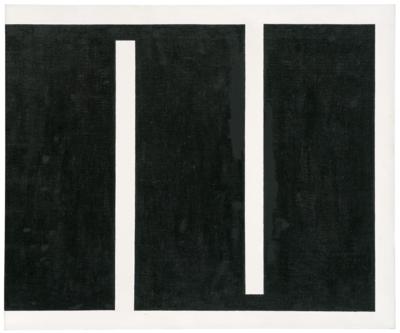Julije Knifer *
(Osijek 1924–2004 Paris)
MA 1, 1970, signed, dated, titled and with technique and measurement on the reverse, acrylic on canvas, 50 x 60.2 cm, framed
We are grateful to Ana Knifer and Gregor Podnar for their kind assistance in cataloging this work.
Provenance:
Galerie Ingrid Dacic, Tübingen
Private Collection South Germany - courtesy from the above, directly from the artist
“Structurally utopian constructs have the status of fictions. They are free of referentiality,
as their spatial perspective is pointing only to a non-locality or in terms of time to
something non-existent. These social systems aspired to be for the most part free of conflict as they are characterized by the pursuit of a state of harmony. This quest for harmony is often linked to aesthetic-theoretical, architectural, geometric-mathematical and spiritual paradigms that seek to compensate deficit inherent in the structure of utopia.
This utopia is the indeterminacy that results from the contradiction between the future and thus non-real and its realization or representation within the work.”
Marion Ackermann, Maria Müller: Kandinsky, Malewitsch, Mondrian –
The Infinite White Abyss, Cologne 2014, p. 216
Julije Knifer is considered one of the most important Croatian representatives of non-figurative art. He was a member of the neo-avant-garde artists' group Gorgona in Zagreb, which was active from 1959 to 1966, and broke away from traditional aesthetic practices in socialist Yugoslavia, instead seeking dialogue with the international avant-garde. In contrast to other countries behind the Iron Curtain, Socialist Realism was not enforced as an official state style in Yugoslavia, and so artists could continue to work in a tradition of abstraction.
From around 1960 onwards, Knifer worked intensively with the ‘meander’ form, a mostly black line on a white background, a strictly and meticulously composed motif, the weighting and inclination of which he repeatedly shifted to the centre in different ways. Knifer’s introduction of white into his works as a "blank space" and as a constitutive moment inevitably recalls Wassily Kandinksy’s "Point and Line to Plane" (1926) and Kazimir Malevich’s "Black Square" (1915).
Knifer expanded the formal radicalism of pre-war abstraction with existentialist spirit through this isolated reduction and repetition as an expression of duration and continuity and at the same time undermined the utopian political goals that often accompanied it.
Specialist: Dr. Petra Maria Schäpers
 Dr. Petra Maria Schäpers
Dr. Petra Maria Schäpers
petra.schaepers@dorotheum.de
23.05.2024 - 18:00
- Estimate:
-
EUR 50,000.- to EUR 70,000.-
Follow Remove
Julije Knifer *
(Osijek 1924–2004 Paris)
MA 1, 1970, signed, dated, titled and with technique and measurement on the reverse, acrylic on canvas, 50 x 60.2 cm, framed
We are grateful to Ana Knifer and Gregor Podnar for their kind assistance in cataloging this work.
Provenance:
Galerie Ingrid Dacic, Tübingen
Private Collection South Germany - courtesy from the above, directly from the artist
“Structurally utopian constructs have the status of fictions. They are free of referentiality,
as their spatial perspective is pointing only to a non-locality or in terms of time to
something non-existent. These social systems aspired to be for the most part free of conflict as they are characterized by the pursuit of a state of harmony. This quest for harmony is often linked to aesthetic-theoretical, architectural, geometric-mathematical and spiritual paradigms that seek to compensate deficit inherent in the structure of utopia.
This utopia is the indeterminacy that results from the contradiction between the future and thus non-real and its realization or representation within the work.”
Marion Ackermann, Maria Müller: Kandinsky, Malewitsch, Mondrian –
The Infinite White Abyss, Cologne 2014, p. 216
Julije Knifer is considered one of the most important Croatian representatives of non-figurative art. He was a member of the neo-avant-garde artists' group Gorgona in Zagreb, which was active from 1959 to 1966, and broke away from traditional aesthetic practices in socialist Yugoslavia, instead seeking dialogue with the international avant-garde. In contrast to other countries behind the Iron Curtain, Socialist Realism was not enforced as an official state style in Yugoslavia, and so artists could continue to work in a tradition of abstraction.
From around 1960 onwards, Knifer worked intensively with the ‘meander’ form, a mostly black line on a white background, a strictly and meticulously composed motif, the weighting and inclination of which he repeatedly shifted to the centre in different ways. Knifer’s introduction of white into his works as a "blank space" and as a constitutive moment inevitably recalls Wassily Kandinksy’s "Point and Line to Plane" (1926) and Kazimir Malevich’s "Black Square" (1915).
Knifer expanded the formal radicalism of pre-war abstraction with existentialist spirit through this isolated reduction and repetition as an expression of duration and continuity and at the same time undermined the utopian political goals that often accompanied it.
Specialist: Dr. Petra Maria Schäpers
 Dr. Petra Maria Schäpers
Dr. Petra Maria Schäpers
petra.schaepers@dorotheum.de
|
Buyers hotline
Mon.-Fri.: 10.00am - 5.00pm
kundendienst@dorotheum.at +43 1 515 60 200 |
| Auction: | Contemporary Art I |
| Auction type: | Saleroom auction with Live Bidding |
| Date: | 23.05.2024 - 18:00 |
| Location: | Vienna | Palais Dorotheum |
| Exhibition: | 11.05. - 23.05.2024 |

